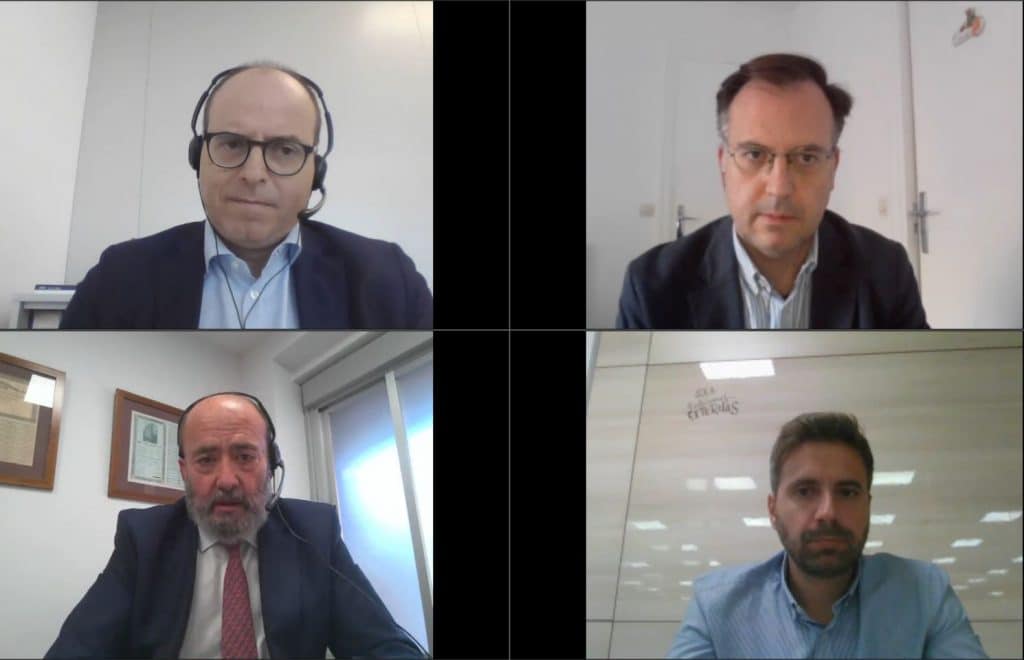Investors are ready to face an uncertain autumn

Redacción Mapfre
Record inflation, central banks turning the tide, a war with yet uncertain consequence and the drums of recession beating. Factors that managers and economists recognize create a very complicated scenario, but also opportunities. This was precisely asserted in the webinar “Oportunidades para la economía y los mercados en un entorno de mayor incertidumbre (Opportunities for the economy and markets in a very uncertain environment),” organized by the MAPFRE Training and Commercial Development Department, with the participation of David Cabero, General Manager of BIC Europe, Jesus Lopez Zaballos, president of EFFAS and manager of the FEF school, and Alberto Matellán, head economist of MAPFRE Inversión. In total, more than 2,300 people registered for the event.
With respect to inflation, the main headache for the central banks, everyone agreed it is the supply shock that emerged in 2020, and therefore, they expect it to remain high for some time. However, unlike other period of dark clouds, the experts acknowledge that now “we are much better prepared: We have strong demand, where family savings is being spent; the banks are healthy and better positioned than in other crises, and unemployment is low.” They also believe that Europe will come out of this situation stronger and that the key is more in seeing the impact on unemployment rather than the inflation itself.
Despite the fact that the central banks have sufficient tools to control price levels, the uncertainty, both economic and in the markets, continues to capture the attention of investors. “We have become accustomed to market concerns and this uncertainty must be worked through without fear or haste.” Therefore, they do not believe it is a pessimistic outlook, but rather a “new environment”.
New context, new opportunities
Lopez-Zaballos believes that, given the new direction on the continent, “attractive assets may arise,” such as those stocks that are currently below their intrinsic value. These are situations that may help the investor benefit and, in this sense, Matellán corroborates that from a management perspective, “it is in times of crisis that greater opportunities arise.”
This is the ideal time, they say, to seek advice, where asset management has taken on a special leading role because it “demonstrates the true art of management and analysis” to seek out the best opportunities. The MAPFRE Inversión economist recalls that both Variable Income and Fixed Income have suffered drops in the last few months, something that “has happened few times in history.” “We're coming from excessive debt, and it's normal, given a change like this, for all asset types to drop,” he explains.

On one hand, Fixed Income is already generating opportunities. This management requires a long-term time horizon, and currently yields of 2-3% can be attained. It serves as a hedge and creates opportunities even when rates are rising,” the MAPFRE expert describes. In the case of Variable Income, he points out that while it is a more risky asset, and there is still room for losses, “there are hidden options separating the wheat from the chaff.”
But, in addition to asset management, the experts point out an indispensable factor that is becoming more relevant among both professionals and investors: financial education. On the advisory side, they consider it essential to have full knowledge of the financial products for their subsequent sale, and to transmit all the necessary information to the end customer in a simple and understandable way. In fact, the president of EFFAS acknowledges that “the CNMV was right when it required advisers to receive continuing education.” Spain, unlike some of its European counterparts, “is on the right track,” he stresses. On the investor side, they emphasize continuing education from youth to senior citizens because, they add, “educating yourself is being up-to-date.”
With all of this, they believe, in this environment of uncertainty, opportunities are there, but to find them, two fundamental factors are necessary: the help of an adviser who, through asset management, guides the investor at all times, and constant education of both customers and managers.



